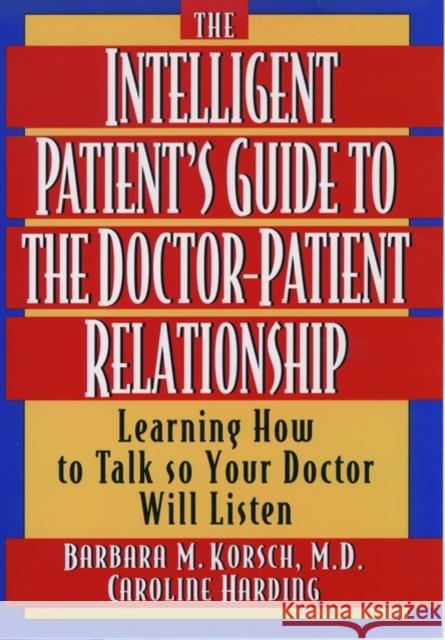The Intelligent Patient's Guide to the Doctor-Patient Relationship: Learning How to Talk So Your Doctor Will Listen » książka
The Intelligent Patient's Guide to the Doctor-Patient Relationship: Learning How to Talk So Your Doctor Will Listen
ISBN-13: 9780195126570 / Angielski / Miękka / 1998 / 304 str.
The Intelligent Patient's Guide to the Doctor-Patient Relationship: Learning How to Talk So Your Doctor Will Listen
ISBN-13: 9780195126570 / Angielski / Miękka / 1998 / 304 str.
(netto: 127,21 VAT: 5%)
Najniższa cena z 30 dni: 126,02
ok. 16-18 dni roboczych.
Darmowa dostawa!
Do you feel that your doctor doesn't pay attention to what you say? Does your doctor cut you off when you try to explain how you feel? Do you think your doctor could remember your name without referring to your chart? Does your doctor seem to be in such a hurry that you don't even get a chance to ask your most important questions? Do you spend more time waiting than actually talking to your doctor? Do you understand what your doctor says? At one time or another, we have all had these complaints. This book will teach you how to ask the right questions, understand the answers, and show you how to take more control of your visits to the doctor and your own health.
This is the first book in which communication pioneer Barbara M. Korsch, M.D., reveals what she has learned about the doctor-patient relationship dilemma during almost half a century of investigation. In clear, simple language, Dr. Korsch answers most of our common questions: How do I know when I'm sick enough to go to the doctor? How do I know if it's serious enough to go to the emergency room? What do I do if I can't follow the advice my doctor gives me? She walks us through a typical visit to the doctor, showing us how to prepare ourselves so we don't forget the question that has been worrying us for weeks as soon as we walk through the doctor's door. She gives important tips on how to survive the dreaded hospital experience. And she offers insight into the doctor's side of the relationship, showing how doctors are trained to be task-oriented and how their natural human sympathy is discouraged throughout their careers. Finally, she offers patients useful strategies for humanizing the relationship.
Korsch's helpful, commonsense recommendations are extensively illustrated with real-life doctor-patient conversations which she recorded on audio and video tape over the course of the last thirty years. She was one of the first medical professionals to emphasize the importance of teaching doctors how to talk to patients as part of their medical training. She serves as consultant and lecturer to medical schools, hospitals, and medical practices throughout the world to help the next generation of doctors communicate with their patients. Above all, after years of research, she has found abundant evidence that the relationship patients form with their doctors directly determines the quality of the care they receive.
This is a vital book for anyone who is concerned about their health and who wants to take control of their medical care. So much depends upon asking the right questions and on finding a doctor who will listen to you. This book gives you the tools and the confidence to do just that.











